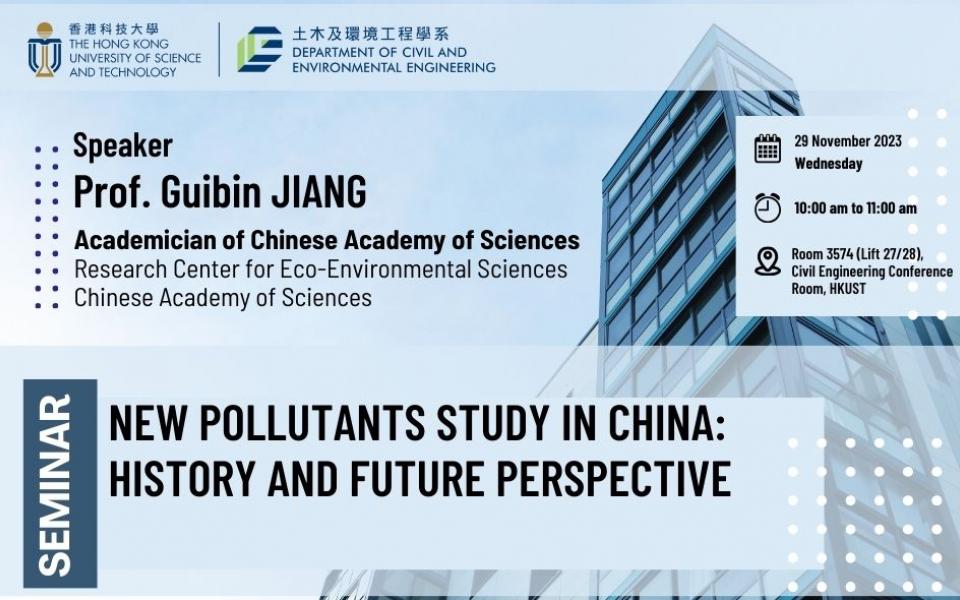Civil Engineering Departmental Seminar - New Pollutants Study in China: History and Future Perspective
Supporting the below United Nations Sustainable Development Goals:支持以下聯合國可持續發展目標:支持以下联合国可持续发展目标:
New Pollutants Study in China: History and Future Perspective
New Pollutant is an emerging scientific term, which refers to any synthetic or naturally occurring chemical or micro-organism that can cause significant known, or suspected, toxic effects and health hazards when deposited in the environment. Typical representatives include persistent organic pollutants, environmental endocrine disruptors, and antibiotics.
International scientific research on New Pollutants has been developing rapidly since the beginning of the twenty-first century. Nevertheless, this does not mean that the research is starting from scratch, but has a lineage with the research on traditional environment organic pollutants, uniting the efforts of Chinese scholars for decades. For example, researches on screening and control for environmental endocrine disruptors was funded by the National 863 Program since 1999. A prospective exploration of the pollution characteristics, interfacial behavior, and health effects of emerging pollutants (i.e., PBDEs, PFAS and SCCPs) has been realized with the financial support of the National 973 Program during 2003-2018.
Compared to traditional pollutants, New Pollutants are characterized by continuity and uniqueness. Persistence (P) and toxicity (T) will remain the main basis for identifying compounds as New Pollutants. In particular, in the dimension of toxicity, the criteria will further reduce the reliance on the in vivo apical effect testing and more rapid biological tools based on cellular pathway effects will be developed. High-throughput and multifunctional systems such as the Integrated Toxicology Analyzer (ITA) and the Stem Cell Toxicology Platform are expected to play an important role in the future.
Dr. Guibin Jiang is an Academician of the Chinese Academy of Sciences, an Academician of the Academy of Sciences of Developing Countries, and an analytical and environmental chemist. He graduated from the Department of Chemistry of Shandong University in 1982 and received his master and doctoral degrees from the Research Center for Eco-Environmental Sciences of the Chinese Academy of Sciences from 1987 to 1991. He is currently Director of Research Center for Eco-Environmental Sciences, Chinese Academy of Sciences, Director of the State Key Laboratory of Environmental Chemistry and Ecotoxicology, Vice Chairman of the Chinese Chemical Society, Vice Chairman of the Chinese Toxicological Society, Director of the Environmental Chemistry Professional Committee of the Chinese Chemical Society, and Chairman of the Beijing Chromatography Society. In 2005, he was commissioned by the American Chemical Society to lead the establishment of the Asian Office of the internationally renowned journal ES&T. His research areas include chemical speciation, analytical instruments, environmental processes and toxicology, environmental applications and effects of nanomaterials. He proposed and promoted the research on persistent toxic pollutants in China. He is Chief Scientist of two phases of the POPs 973 project, the head of major funds and innovation groups of the National Foundation Commission, a member of the National 973 Advisory Group, a member of the National Major Nano Research Program Expert Group, and a member of the National Environmental Protection Agency. He received the National Science Fund for Distinguished Young Scholars in 1998, and the Young Scientist Award of the Chinese Academy of Sciences in 2001. He was awarded the Second Prize of the National Natural Science Award as the first awardee twice in 2003 and 2011, and in 2007 he was awarded the Yangtze River Scholar Achievement Award. He was elected as an Academician of the Chinese Academy of Sciences in 2009 and as an Academician of the Academy of Sciences of Developing Countries in 2012.
